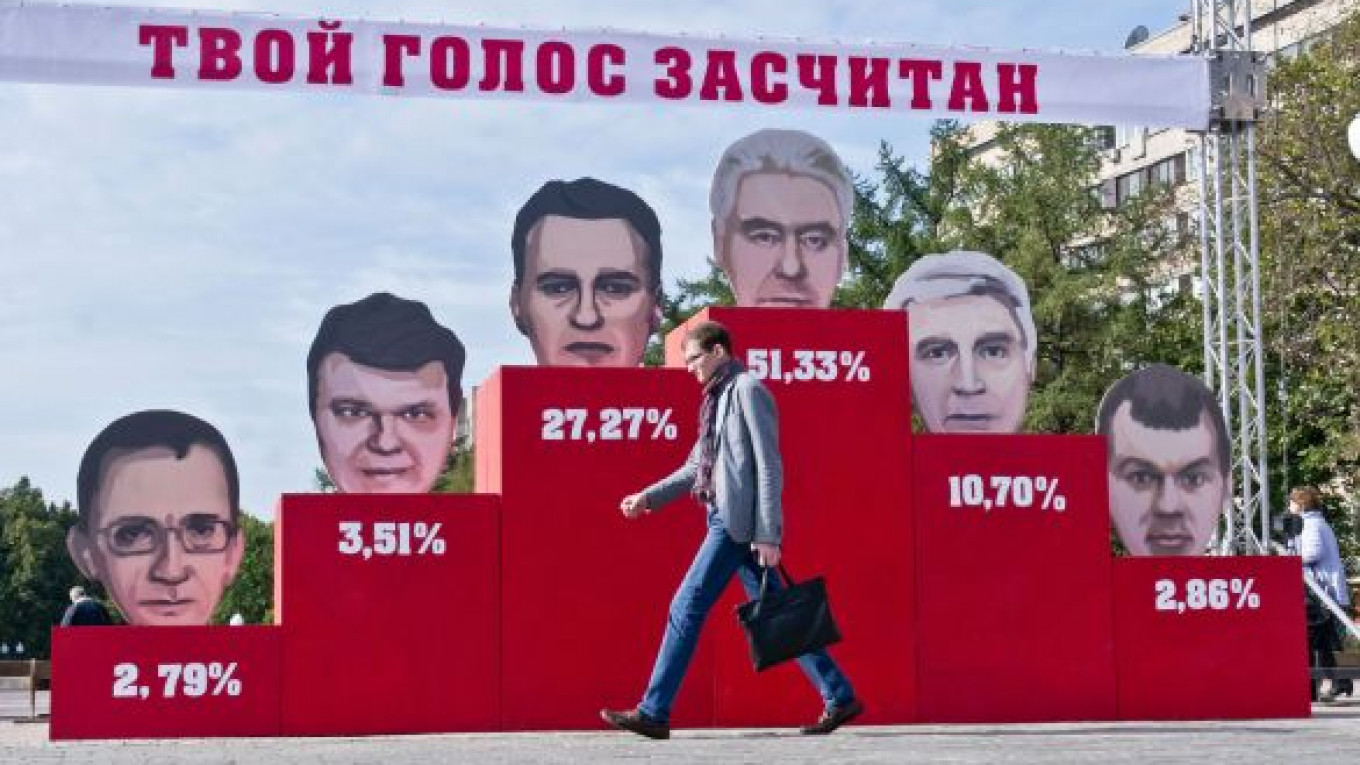Kremlin-backed candidate Sergei Sobyanin got a victory at Moscow's mayoral election Sunday, but opposition star Alexei Navalny walked away with a symbolic victory by getting more than he or the government bargained for, analysts said.
According to official results, Navalny garnered 633,000 votes in a city with 7.25 million registered voters, while Sobyanin was supported by 1.2 million Muscovites.
Despite the victory of Kremlin-backed Sobyanin, however, analysts say the Kremlin is left with much less leeway to pursue its own goals, since it now has to take into account an alternative power structure gradually emerging in Moscow.
"Navalny has become a figure [that] the government has to reckon with," said Nikolai Petrov, a professor at the Higher School of Economics. "Depending on how they treat him, they can either enhance his political capital or diminish it, but Navalny is growing stronger."
Navalny's imposing status may stem from his unusual recent circumstances.
Just weeks before election day, Navalny was sentenced to five years in prison after being found guilty of embezzling timber in the provincial town of Kirov. The day after his arrest — and after massive street protests erupted in Moscow in response — he was released pending appeal in an unprecedented move by local prosecutors. ?
Incumbent Mayor Sobyanin said at that time that all candidates should take part in the elections to ensure that the real will of Muscovites was reflected. ?
But the drama surrounding Navalny's jailing and immediate release seems to have enhanced his image so much that it doubled his electoral rating in a matter of weeks.
His vigorous election campaign did not hurt either: Upon his release, he gave speeches in more than 100 neighborhoods throughout Moscow.
Combined, Navalny's unique situation and innovative campaigning techniques have thrust him into the spotlight as the indisputable leader of the "nonsystemic opposition" in Russia, analysts said, but the situation has also created an army of campaigners with their own message, structure and style.
"This political machine will now work for the next elections. Navalny has demonstrated that he is a very effective politician that will now serve as an example for others," Petrov said.
Despite low voter turnout, Navalny wound up getting nearly double the amount of votes that pre-election polls by VTsIOM and the Levada Center estimated.?
Sobyanin's team was quick to attribute Navalny's unexpectedly large share of the votes to the transparency and fairness of the overall campaign. Others said it was due to the incompetence of the incumbent mayor's team.
"Sobyanin's campaign staff failed to realize that the situation had changed and that in the absence of administrative backing, they'd have to put forward a more cohesive and active campaign," said Alexei Mukhin, a Kremlin-friendly expert at the Center for Political Information.
"The opposition wanted fair elections, and the government did everything to facilitate that. Now, it would be wrong for the opposition to deny what they got," he said.
Some say the government did not provide for more open elections on its own volition, however. Experts chalked this newfound openness to the increased civic activity that followed the disputed 2011 State Duma elections.
"The government doesn't have much of a choice now," Petrov said. "It can no longer turn back the screws and do it the old way."
This new reality may not necessarily be more democratic, however. Stanislav Belkovsky, a political analyst and Navalny's long-time backer, was skeptical about the election results.
"Navalny has acquired some [of the] traits of his main enemy, Vladimir Putin," he said. "He manages his followers by generating a massive psychosis around himself. Even strong and educated people fall victim to it."
As a consequence, he said, the "virtuous opposition" sees all criticism of Navalny as blasphemy.
"He is a clever, ironic and rational man, so he does this all consciously. Our intelligentsia wanted a Weimar Russia, and here you have it, as well as its leader," he said.
Contact the author at i.nechepurenko@imedia.ru
A Message from The Moscow Times:
Dear readers,
We are facing unprecedented challenges. Russia's Prosecutor General's Office has designated The Moscow Times as an "undesirable" organization, criminalizing our work and putting our staff at risk of prosecution. This follows our earlier unjust labeling as a "foreign agent."
These actions are direct attempts to silence independent journalism in Russia. The authorities claim our work "discredits the decisions of the Russian leadership." We see things differently: we strive to provide accurate, unbiased reporting on Russia.
We, the journalists of The Moscow Times, refuse to be silenced. But to continue our work, we need your help.
Your support, no matter how small, makes a world of difference. If you can, please support us monthly starting from just $2. It's quick to set up, and every contribution makes a significant impact.
By supporting The Moscow Times, you're defending open, independent journalism in the face of repression. Thank you for standing with us.
Remind me later.


